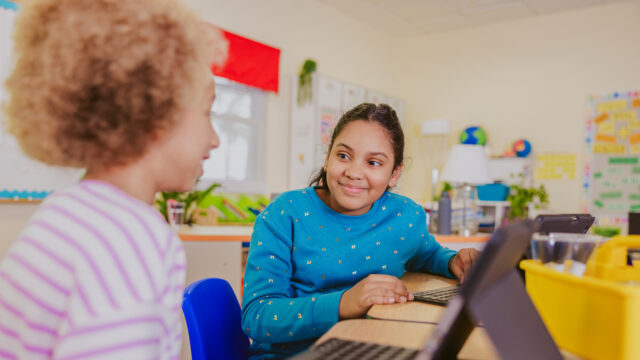
Young children are natural experts when it comes to learning critical skills. Unlike other mammals, babies need adult help for nearly everything. In their first year, while kittens are already batting at mice and colts are walking on their own, young humans are studying and mimicking their parents. Children come to understand that their survival depends on learning from their families and environments. As they acquire language skills, little ones become attuned to using words and gestures to help express what they feel and to get what they need.
In 1995, University of Kansas researchers Betty Hart and Todd Risley published a seminal study on vocabulary acquisition in preschool aged children, Meaningful Differences in the Everyday Experiences of Young American Children. Hart and Risley spent over two years studying the lives of 42 families of varied socioeconomic backgrounds, discovering substantial differences in how families spoke with children and how many words children were exposed to regularly. This research underscored the core principle that exposure to language early and often is crucial in preparing young children for success and closing achievement gaps at the elementary school level.
But language is not only about verbal skills and words. Context, gesture and environmental awareness are key factors in the way humans communicate, and young learners pay close attention here as well.
Erica Cartmill, Assistant Professor of Anthropology at UCLA, has produced fascinating research on the dynamic relationship between early social interactions and infant communicative development. Her research reinforces the theory that preschool vocabulary is a major predictor of school success, with particular focus on the role that both verbal and nonverbal forms of communication play in language acquisition. She notes that gesture in particular is an essential tool for children before they are fluid with verbal language.
As we can easily imagine, most of the words very young children acquire are derived from their parents’ vocabulary. But more than hearing words, the non-verbal clues that parents give toddlers about words are part of the context of learning, and influence the depth of children’s vocabularies upon entering school.
As parents and caregivers, we can take advantage of the experiences we share with our children to support language acquisition, especially if we keep in mind their perspective.
Here are our top six practical, everyday suggestions to help boost vocabulary in early learners:
- See Something, Say Something: Describe things that are happening as they are happening, e.g. “Here comes a dog,” as opposed to “We’re going to see a dog.” Children have been shown to learn words more quickly when they can see and feel the object, as opposed to an abstract word with no apparent context.
- Be Descriptive: Encourage children to describe what they see. Typically when we point out objects to young children, for example a cow, car, boat, etc., we get stuck on nouns. Invite descriptions including shape and color (adjectives) and movement (verbs).
- Practice Anytime, Anywhere: Take advantage of time in the car or at the supermarket to practice word play, pointing out objects of interest as you talk about them to help provide immediate context and explanation.
- Provide Feedback: Reflect back what children say to you. This confirms their experience and affirms their ability to have a successful conversation.
- Use Non-Verbal Clues: Remember; children are sensitive to gestures, facial expressions, tone of voice and other non-verbal actions, both in conversation and in educational situations.
- Offer Positive Reinforcement: When children are pointing at people or objects, validate and name them.
###
Susan Magsamen is the Senior Vice President of Early Learning at Houghton Mifflin Harcourt, a member of the Educational Advisory Board for the Goddard School, co-founder of The Johns Hopkins Neuro-Education Initiative and founder of Curiosityville.


















